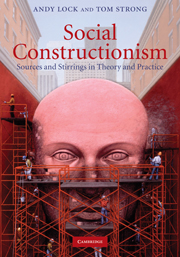Book contents
- Frontmatter
- Contents
- Preface
- Acknowledgements
- 1 Introduction
- 2 Giambattista Vico
- 3 Phenomenology
- 4 Hermeneutics
- 5 Marxism and language
- 6 Lev Vygotsky
- 7 Meanings and perspectives
- 8 Ludwig Wittgenstein
- 9 Gregory Bateson
- 10 Sociologies – Micro and Macro
- 11 Sources of the self
- 12 Michel Foucault and his challenges
- 13 Discourse analysis
- 14 Ken and Mary Gergen
- 15 Rom Harré
- 16 John Shotter
- 17 Concluding remarks
- Bibliography
- Index
12 - Michel Foucault and his challenges
Published online by Cambridge University Press: 05 June 2012
- Frontmatter
- Contents
- Preface
- Acknowledgements
- 1 Introduction
- 2 Giambattista Vico
- 3 Phenomenology
- 4 Hermeneutics
- 5 Marxism and language
- 6 Lev Vygotsky
- 7 Meanings and perspectives
- 8 Ludwig Wittgenstein
- 9 Gregory Bateson
- 10 Sociologies – Micro and Macro
- 11 Sources of the self
- 12 Michel Foucault and his challenges
- 13 Discourse analysis
- 14 Ken and Mary Gergen
- 15 Rom Harré
- 16 John Shotter
- 17 Concluding remarks
- Bibliography
- Index
Summary
Unlike Vico – with whom we started our narrative, and whose work is almost unheard of by contemporary social scientists – everyone has heard of Foucault. One of Foucault's earlier works, Les Mots et les choses: Une archéologie des sciences humaines (1966; English translation by Alan Sheridan, as The Order of Things, 1970) was an instant best-seller in France, which might be thought odd given it makes no concessions to a lay readership. However, as his translator Sheridan points out, Lacan's work, Écrits (also 1966, also translated by Sheridan, 1977), which is perhaps one of the most impenetrable of books on the human condition, similarly attained best-seller status. Both books are most likely children of their time – in much the same way as Stephen Hawking's A Brief History of Time was to the late 1980s: a book as a commodity that one, or one's coffee table, needed to be seen with. That Foucault's work was attacked by France's premier intellectual, Jean-Paul Sartre, also made for good advertising copy.
Foucault's work has been enormously influential in recent social science and humanities scholarship. Foucault is, undoubtedly, a difficult though evocative read, and consequently there has been a massive literature of commentary and introduction aimed at making his work more accessible. While a great deal of this literature is itself also difficult to penetrate, its existence narrows our task here more to Foucault's impact on the general project of social constructionism than to a summary of his work (not that such a summary would be possible: his work is in many ways a moving target).
- Type
- Chapter
- Information
- Social ConstructionismSources and Stirrings in Theory and Practice, pp. 244 - 268Publisher: Cambridge University PressPrint publication year: 2010



